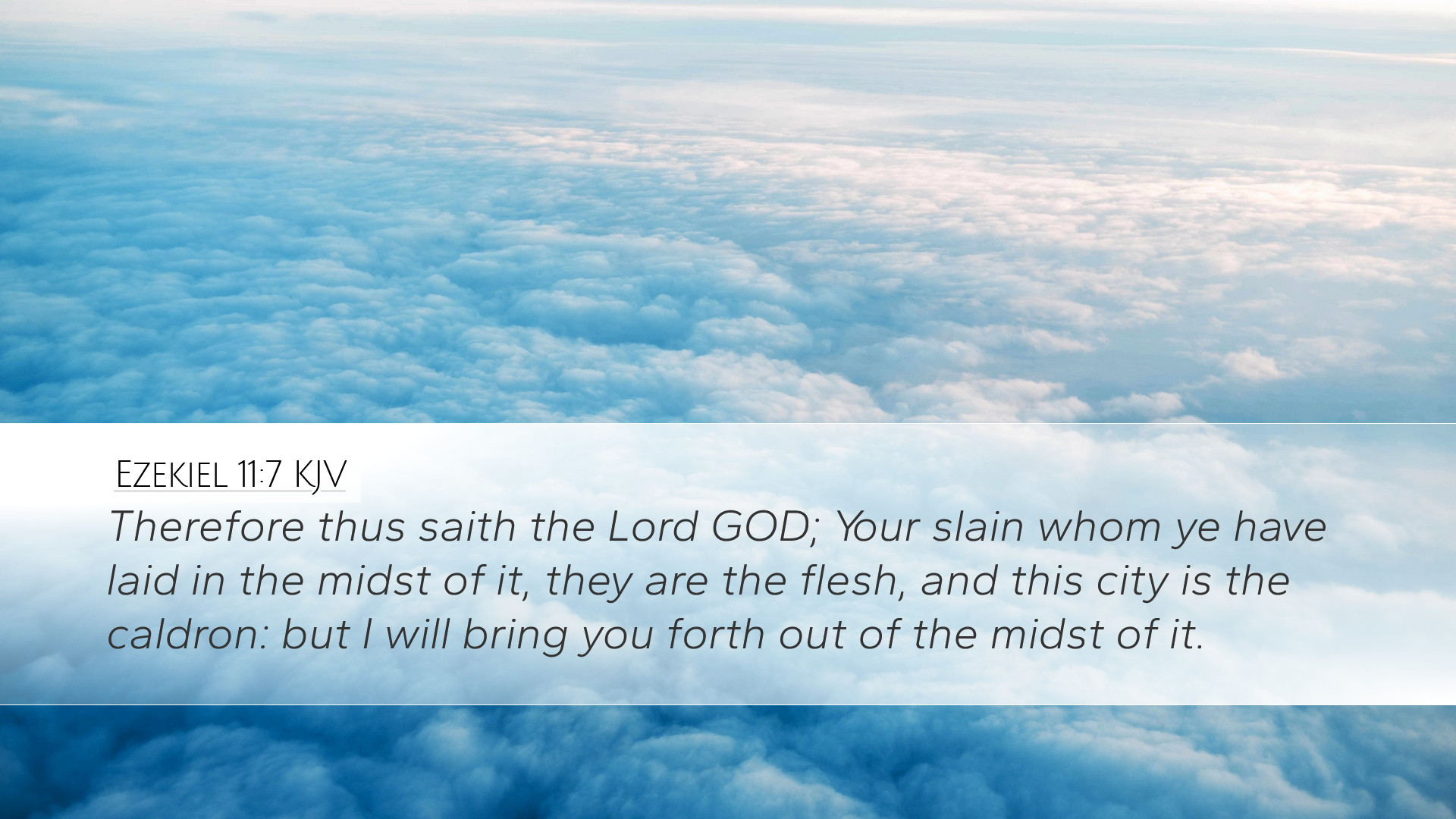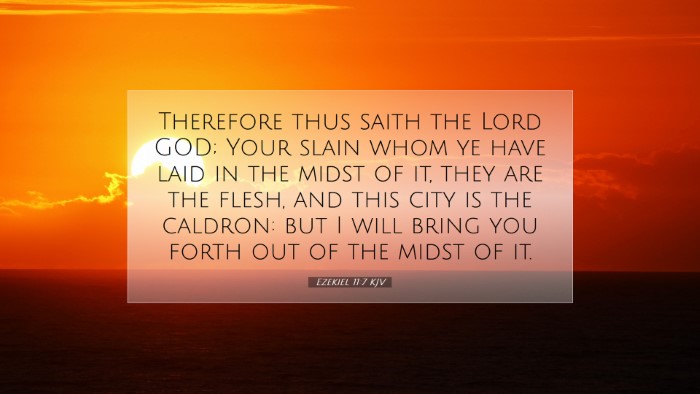Bible Commentary on Ezekiel 11:7
Ezekiel 11:7 states: "Therefore thus saith the Lord God;
Ye are the slain in the midst of it, whom ye have laid in the midst of it,
and the city is full of injustice."
Contextual Overview
The Book of Ezekiel, authored by the prophet Ezekiel, is a profound exploration of the themes of judgment, restoration, and the presence of God among His people.
Set during the Babylonian captivity, the passages convey God's messages to a nation in turmoil.
In this context, Ezekiel 11:7 serves as a poignant reminder of the consequences of the people's sins and corruption.
Exegesis of Ezekiel 11:7
In this verse, the Lord declares that the people of Jerusalem, whom He refers to as "the slain," are the victims of their own sins.
The consequences of their actions have led to moral decay, legal injustice, and ultimately, divine judgment.
The term "the slain" metaphorically emphasizes the spiritual death resulting from their disobedience to God's commandments.
Insights from Matthew Henry
Matthew Henry elaborates on this verse by underscoring the severity of the moral state of Jerusalem.
He posits that the city has become a "field of slaughter" due to its inhabitants' transgressions.
Henry interprets "the slain" not solely as physical suffering but as an indictment of their spiritual and moral failure.
They have not only victimized themselves through idolatry and injustice but have also become a warning to others about the peril of turning away from God.
In Henry's view, God's judgment is just; they have brought upon themselves the calamities they experience.
Ezekiel’s mission is to communicate God's discontent with a people who have forsaken Him, illustrating the prophetic role of calling the nation to repentance.
Insights from Albert Barnes
Albert Barnes provides a historical and prophetic analysis of Ezekiel 11:7.
He sees the "slain" as representative of the leaders and people within Jerusalem who, due to their sinful practices, have become casualties of divine judgement.
Barnes argues that the Lord's declaration serves not only as a condemnation but also as a prelude to the impending restoration promised in later chapters.
Barnes emphasizes the duality of judgment and hope. While the verse reveals the grave situation, it also sets the stage for the eventual reformation and renewal that God promises to His people.
His comments invite readers to reflect on their own lives where injustice might reign and encourage them to seek God's mercy and redemption.
Insights from Adam Clarke
Adam Clarke's commentary expands on the interpretation of "the slain" by focusing on the metaphorical significance attached to this term.
Clarke notes that it signifies not just physical defeat but spiritual desolation.
The city, described as full of injustice, underscores the social and moral chaos that results from a departure from divine principles.
Clarke also highlights the prophetic voice of Ezekiel, suggesting that his role is crucial in delivering messages that confront and challenge both the rulers and the people.
This commentary underscores the urgency of repentance and the need for societal transformation based on God’s righteousness.
Theological Reflections
Ezekiel 11:7 raises profound theological questions about divine justice and human accountability.
The juxtaposition of God’s judgment with His mercy opens avenues for pastoral and theological discourse, especially regarding the themes of sin, redemption, and the hope for restoration.
-
Divine Justice: The verse starkly illustrates the consequences of straying from divine law, making it essential for reflecting on God’s just nature.
-
Human Accountability: This passage emphasizes individual and collective responsibility in upholding justice and righteousness in society.
-
Hope for Restoration: While judgment is pronounced, the subsequent chapters of Ezekiel promise a future hope, encouraging believers to trust in God’s redemptive plan.
Conclusion
Ezekiel 11:7 serves as a crucial reminder for believers, scholars, and church leaders.
The insights from esteemed commentators such as Matthew Henry, Albert Barnes, and Adam Clarke provide a multifaceted understanding of the text.
It challenges us to examine our lives and communities, urging us toward greater righteousness and a deeper reliance on God's grace for restoration.
As we reflect on this verse, may it inspire us to engage actively in the pursuit of justice and to be vigilant against the spiritual and moral slayings that may come from neglecting our covenant with God.


